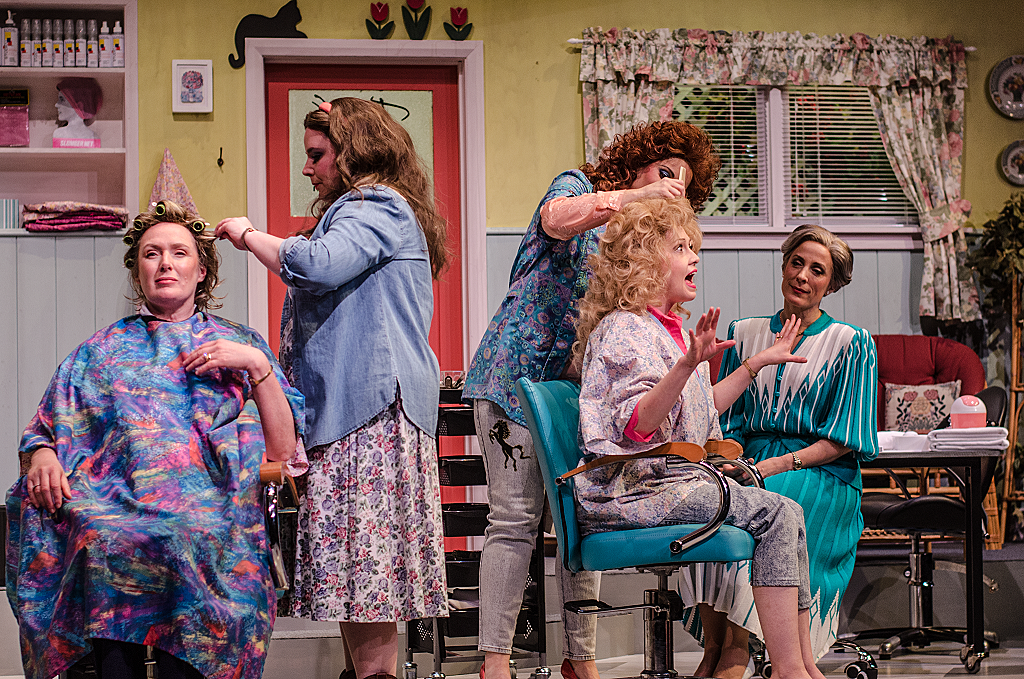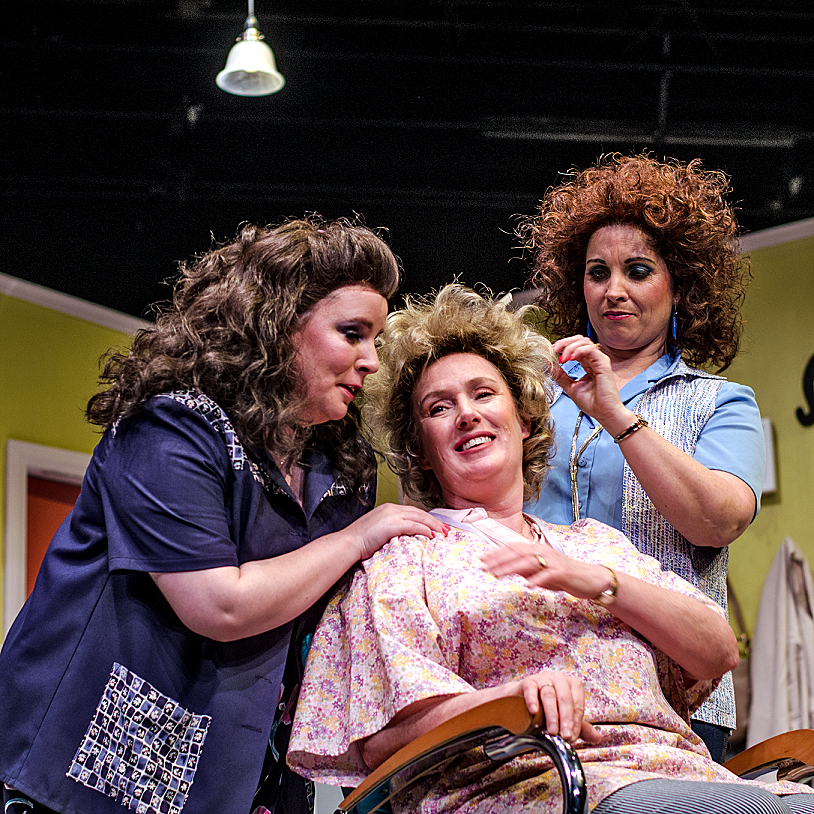Perm and Set: A Review of Steel Magnolias
Erin Harrington heads to the 80s Louisiana weepie but stays remarkably dry.
Erin Harrington heads to the 80s Louisiana weepie but stays remarkably dry.
Robert Harling’s 1987 play Steel Magnolias is a sweet-hearted, much-loved American tragicomedy about the complexities and comforts of female friendship, and it’s meant to leave the audience blubbering. The play, which was adapted for the screen in 1989, is as synonymous with a good, sloppy, ugly cry as is its weepie stablemate, 1988 film Beaches, and it’s just as tragic.
Truvy’s, a beauty salon in small-town Louisiana, acts as the civic and emotional community hub for the various women who come to get their perms back-combed and their nails shaped. It’s no spoiler to reveal that bright, bubbly 20-something diabetic Shelby, who loves but is a little at odds with her mother M’Lynn, doesn’t make it to the final curtain. The moment she has a bad turn in the play’s first scene, as she’s having her hair done for her wedding, she might as well have ‘dead woman walking’ flashing in hot pink neon above her head. This knowledge of impending tragedy only serves to hone the interplay between pathos and comedy – ‘laughter through tears is my favourite emotion’ cries salon-owner Truvy – but I left The Court Theatre’s pedestrian production dry-eyed and disengaged.
I must note that I genuinely appreciate that this is a play that focuses on women’s lives and relationships, and that it showcases the talents of an ensemble cast of six women, some of whom I have pretty sizeable theatre crushes on. While I’m not enamoured of how few female writers and directors the Court regularly features, or the stunning lack of equity in casting and production more broadly in New Zealand, the play’s programming at least gestures, perhaps, towards the portion of the population that buys the majority of the tickets but so rarely sees themselves represented on stage.
But, why this particular play, in Aotearoa New Zealand, in 2017? There’s not a strong point of view evident, although it’s notable that in a contemporary cultural environment saturated with irony and pastiche, the play’s late 80s setting, complete with amazingly zhuzhy wigs and big-shouldered costumes from Pam Jones and Sarah Greenwood-Buchanan, is not treated as a distant period piece or played for laughs. The play is still sound, but it’s more a form of comforting American nostalgia, theatrical soul food-lite, than a lens through which we might think about the present.
It feels as if the play would keep rolling on whether or not there was an audience present.
It doesn’t help that Greg Cooper’s production feels like it’s been blocked within an inch of its life rather than empathetically directed. There’s a lot of precise, choreographed movement that cleverly incorporates the business of the salon, but there’s no urgency, clear narrative, or thematic point of view. Comic beats are hit, but not emotional ones; well-rehearsed verbal patter allows little time for silence or genuine reaction; actors move efficiently through the stage space, but rarely seem to have meaningful relationships or histories with one another. I realise at the beginning of the second act that big, bolshy group conversations are delivered at the same volume and pace and with the same projection as intimate one-on-ones. It feels as if the play would keep rolling on whether or not there was an audience present.
My plus-one wonders if the orientation of Nigel Kerr’s functional and well-appointed set has a little to do with this. There’s an ingenious, applause-worthy reveal at the beginning that opens up the cosy space of the salon, but the actors are often looking into fixed, unseen mirrors in the ‘invisible’ walls to make reflected eye contact with one another. While this gives the salon its own sense of spatial logic, it has the unfortunate side effect of excluding us from the action and disengaging the actors from one another; we are less a voyeuristic fly on the wall than we are struggling to peer in the windows. The fact that the audience around us kept bloody talking perhaps speaks to this sense of disconnect.
I must admit that this detachment sums up my rather ambivalent experience of mainstage shows at the Court in the recent years. For every knockout – the kinetic The Curious Incident of the Dog in the Night-time (2017), the joyous Mary Poppins (2015-6), the bonkers near-future sci fi Shepherd (2015), the exquisite When the Rain Stops Falling (2014) – there are three or four well-cast, well-designed shows that puddle along blithely without ever finding much traction. That’s not a good strike rate, and it is such a hallmark of the Court’s large productions at present - the mainstage’s signature flavour profile - that I wonder if it speaks somehow to the company’s artistic culture and organisation.
There are a handful of moments that hit that sweet spot, fizzing with spontaneity and honesty: Lucy Porter (naïve salon newcomer Annelle) spins round on a salon chair, sighing dramatically; Yvonne Martin (crotchety neighbour Ousier) nails an unexpected punchline; Kathleen Burns (sweet, doomed, headstrong Shelby) gives counter-intuitive reads on lines for great comic effect; Lara Macgregor (Shelby’s firm and loving mother M’Lynn) stomps on the floor in full, grief-stricken meltdown. But. But! Theatre is an immediate, human medium that has a unique capacity to grab us by the heart and the throat. This production achieves little with its considerable resources. I don’t think that it’s churlish to want, or even expect, more than a dash of effervescence in a two-and-a-half hour show.
Steel Magnolias runs from 5 August – 1 September at The Court Theatre. Tickets available here.



